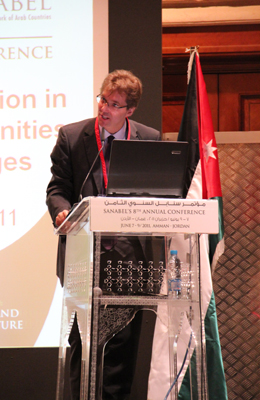Sanabel Annual Conference: Plenary panel on the “State of the Sector” and the impacts of political crises
 Timan Ehrbeck, CGAP CEO
Timan Ehrbeck, CGAP CEO
Day one’s plenary session began with a keynote presentation by CGAP CEO Timan Ehrbeck (which was similar to his recent presentation at the June 2 After Hours seminar) where he emphasized the importance of understanding the demand side of the sector.
He then drilled down from that global perspective to provide a regional overview. In the formal economies of the Arab region, microenterprises represent anywhere from 78-98 percent of businesses, and that doesn’t even take the informal economy into account. For this reason, Ehrbeck called for “more [microfinance] actors operating with great coordination,” to reach the un- and under-served. He also called for innovation in the service distribution channels through technology like cell phones as well as through existing infrastructure like postal branches which already have a strong rural presence in many Arab countries.
Ehrbeck’s other recommendations for MFIs included strengthening governance, improving portfolio quality, and diversifying product offering. Based on the pre-conference Policy Forum, he also presented a few key regulatory issues currently getting a lot of attention: allowing MFIs to take deposits, adopting consumer protection regimes, facilitating branchless banking, and exploring government-to-person (G2P) payments.
Ranya Abdel-Baki, Sanabel’s Executive Director
Ranya Abdel-Baki spoke next and provided a fast-paced and information-packed presentation based on data from Sanabel’s latest Arab Microfinance Regional Report. According to the research, the Middle East and North Africa (MENA) region microfinance industry has the highest return on assets (ROA), the second highest return on equity (ROE), and the second highest portfolio quality by global comparison to other regions. Despite these successes, the region has the lowest committed funding and the lowest growth in funding. Abdel-Baki called on the conference participants to help address this key challenge. She then went on to discuss the recent revolutions and uprisings in the region and their impact on the microfinance industry.
According to information provided by Sanabel’s MFI members in Tunisia, Egypt and Yemen, the recent political crises in those countries have had serious effects on internal operations and on expenses. They also brought to light the lack of contingency planning on the part of most MFIs. Another danger that came out of the revolutions was the perception of an MFI’s affiliation with government or established power base, which caused borrowers to question whether the MFIs would remain open and if they should bother repaying their loans.
Abdel-Baki ended her presentation on political instability and what it means for the industry with a few lessons learned. First and foremost, MFIs must preserve client loyalty by maintaining their relationships with constant communication, continuous operations, and loan renewal for clients with good performance. It is also critical to keep staff satisfied and many MFIs interviews provided extra staff incentives during the crises. She also reiterated Ehrbeck’s call for contingency planning and the importance of insurance.
Panel on Political Instability

The plenary session ended with a panel on the impact of the crises earlier this year in Tunisia, Egypt and Yemen. Essma Ben Hamida from Enda Inter-Arabe in Tunisia spoke about her MFI’s experience and the increased risks, increased costs (estimated at $4 million—more than Enda’s 2010 net profit), and lower client productivity that resulted from the revolution. Despite the challenges, Enda worked hard to be present in their branches and accessible to clients. They listened to their borrowers and reassured them through constant communication as well as mobilizing their network and respected clients to advocate on their behalf in the community. Lastly, Enda refinanced loans and rescheduled payments to ease their clients’ burdens during the chaos. Ben Hamida ended with the following list of recommendations:
- Set up a crisis unit and have a plan
- Adopt a flexible management information system (MIS) to allow for refinancing and rescheduling
- Have client information (especially phone numbers) easily accessible for constant communication
- Use technology like SMS to reach out to clients
- Invest in loan insurance
- Diversify your portfolio
- Help your clients find alternative markets
Motaz Al Tabaa of the Egyptian Microfinance Network and Mohammed Al-Lai of the Yemen Microfinance Network shared similar stories to that of Ben Hamida. Al Tabaa stressed that rapid and customized response was critical. Al-Lai shared his thoughts on factors for the future success of the industry: addressing human resource and capacity challenges, securing sustainable financing, encouraging innovation, and promotion good governance and risk management.


